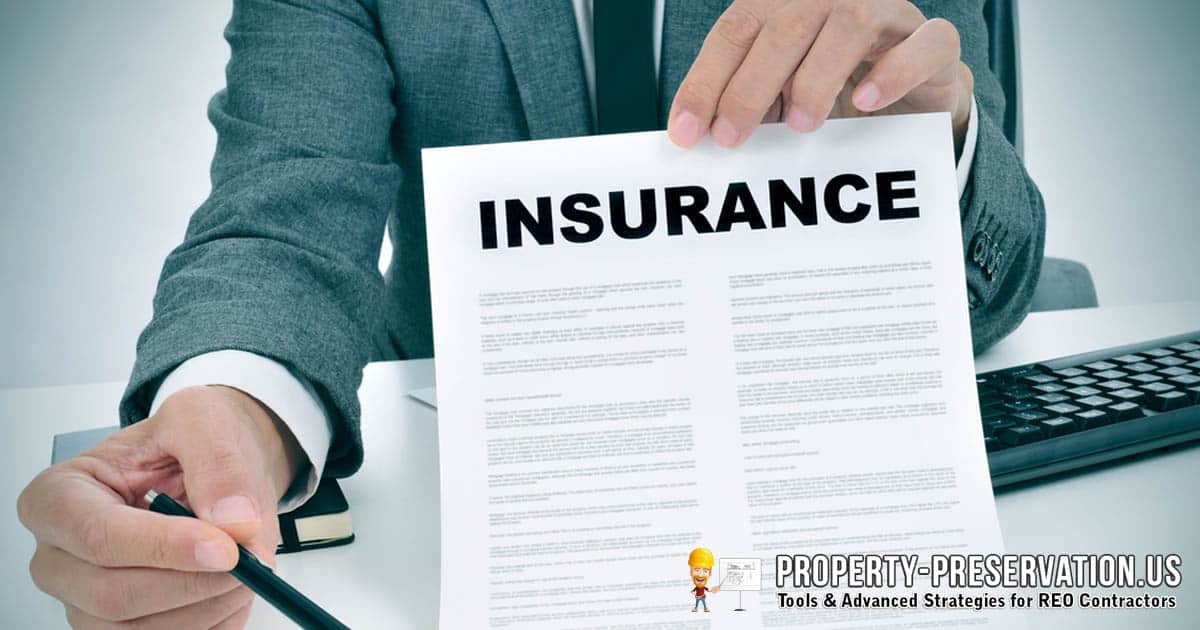Before you start any work whatsoever, it is critical that you have appropriate insurance in place to protect yourself, the property you work on, and anyone you hire. You will need both commercial liability insurance and workers’ compensation insurance at a bare minimum. Many AMCs will verify that you have these policies in place before they agree to work with you.
Initially, securing insurance will represent one of your biggest costs. To make the expense more palatable, arrange a monthly payment plan so that you don’t need to hand over large amounts of cash up front.
Every insurance company and policy has its own distinct advantages and disadvantages. It isn’t possible to review them all in depth here. However, we will take a look at the typical jargon you will encounter when you start researching insurance policies and the amount of money they will set you back by.
General Liability Insurance
General liability insurance will protect you against any costs you face in the event your business or activities cause injury or damage. It covers a range of expenses including, but not limited to:
- Any legal fees you incur as a result of defending yourself against a legal or civil charge against you. These include court costs, police charges, attorney fees, etc.
- Any settlement fee that results from a suit that is filed against you.
- Any interest in the judgment against you if your defense fails.
- The medical expenses of any individuals who were injured as a result of your activities.
- Any premiums or bonds that are needed for a liability suit.
Each general liability insurance policy will differ and, as such, it is important that you research what’s available to ensure that the policy small print is aligned with your distinct needs. Some special areas of coverage that you may come across are listed below:
- Injury: Protection against any injury, illness or disease that you may be legally liable for as a result of your business activities.
- Damage to property: Protection against any damage you cause to a property you are working on or that of another person as you carry out your business activities.
- Contractual liability: Protection against any liability you may have as a result of agreeing contracts with external parties; for example, a building lease.
- Errors and omissions: This is also referred to as professional liability, and it protects you against any litigation you may encounter as a result of failing to fully perform your business duties.
- Excess liability: This is also known as umbrella liability. It comes into use if a claim against you exceeds the amount covered by the insurance policy. For example, if your policy covers you for up to $2.5 million, but a claim settlement is agreed to the amount of $3.2 million, your excess liability policy will cover the difference.
- Hired auto and non‐auto liability: This cover will protect you from any traffic accident that yourself or someone who works for you is involved in during the course of performing your business duties, be it in a company vehicle or a personal car that is being used on company business.
- Personal and advertising injury: Protection against any offenses you or someone who works for you commits in the course of your business or advertising activities. This form of insurance will cover aspects such as libel, copyright infringement or slander.
Workers’ Compensation Insurance
Workers’ compensation insurance may also be referred to as employers’ liability insurance, and it is mandatory in the majority of states for businesses that employ W2 employees. Workers’ compensation insurance covers any medical and disability costs your employees incur as a result of any work-related illness or injuries they encounter.
Depending on which state you operate in, you may also be required to have insurance in place to cover the use of up to 1099 contractors. If this is not the case, it remains your responsibility to ensure that any contractors you use have their own liability insurance in place.
This can be problematic, as very few contractors will have their own insurance and you may, therefore, struggle to find people to work for you under such an agreement. For this reason, it is often more effective to cover the contractor insurance yourself. This will allow you to secure contractors quickly and easily without having to worry about whether or not they have insurance in place.
Although this will increase your insurance costs, it gives you peace of mind that all your workers are adequately covered by insurance. If you have any doubts about what the best course of action is for you and your business, seek professional advice from a qualified agent. He or she will be able to point you in the right direction.
When you’re arranging workers’ compensation insurance, don’t forget to cover yourself!
Insurance is extremely important, and it’s not something you should risk getting wrong. Make sure you thoroughly research the legal requirements in the state in which you operate and that you have full coverage in place for all eventualities.
Insurance Costs
Yes, insurance is undoubtedly expensive and represents a significant cost of running a business. However, you should never lose sight of the fact that while insurance may be steep, the cost of not having it far outweighs the price! I have lost track of the amount of times people who are keen to get into this business ask, “Do I really need insurance?” The answer to this question, every single time, is a resounding “Yes!”
Don’t question it, just accept it: insurance is compulsory, and you should never, ever commence operations without it.
So, we’ve established that insurance can be expensive, but just how expensive is it? Well, this will depend on the type of services you offer. For example, if you plan to operate purely as a cleaning services provider, your insurance company will view you as a janitorial company, and you will find the insurance costs relatively palatable.
On the other side of the scale, if you’re planning on offering repair and maintenance services, you’re going to need some level of contractors’ insurance, and this comes at a bigger premium. Remember, even if you’re not actually planning on delivering the services yourself and will be subcontracting the work to a third party, you may still need to have this insurance in place. Check first!
In light of the fact that your insurance cost for providing cleaning services will probably be significantly less than that for providing maintenance services, you may be tempted to opt for the lowest premium by telling your insurer that you’re a janitorial company when, in reality, you’re doing much more. This is no good; you may as well have no insurance whatsoever.
Your insurance company will thoroughly research any claim that is brought against you. If they find out that you often provide services that are different from those you specified when you arranged the insurance, your insurance may be completely invalidated, even if the claim itself is within the scope of your policy. That will leave you well and truly in a sticky situation, and you’ll be fully liable for any claim that is brought against you. Good luck with that.
The same logic is true when it comes to covering your employees. Don’t be tempted to downplay the number of employees who are working for you for the purposes of the insurance. It is in your best interests to make sure you have full coverage for every single worker (and contractor) you use. If you start off with a small number of workers, but this increases during the insurance term, make sure you inform your insurance provider in a timely manner.
Another reason why you should ensure you keep your insurance company abreast of any changes to your business, staff and operating scope is because many firms complete an insurance audit at the end of each year. The purpose of this is to ensure that you have paid the correct premium.
Sometimes, insurance companies will go into significant detail when performing this audit and you may be required to provide employee payment slips, invoices, receipts, etc. If you have told any porkies in the course of arranging your insurance, it’s highly likely an insurance audit will uncover them, and you may find yourself in big trouble.
You simply shouldn’t risk having insufficient general liability or workers’ insurance at any time. Trust me: when it comes to insurance, dishonesty is absolutely not the best policy. If you don’t have adequate cover in place, you literally place everything you have on the line and could lose your home, your business, car, wife… everything.
Will You Need to Secure a Contractors’ License?
The answer to this will depend on the extent of the work you are performing. If you are simply cleaning out the house, removing junk and making basic repairs, you won’t need any type of official documentation. However, if you will be completing more intensive work, you will need to check the regulations of the state in which you are operating.
In some states, there are provisions for handyman services that will allow you to complete a certain amount of work providing it falls under a predetermined dollar amount. However, in other areas, you will need a specific contractors’ license and getting your hands on one of these can be far from straightforward.
On the next page, you will find a list of useful contact numbers. Call the number that is relevant to your state/area of operation and ask for advice on the type of license you will need for the work you plan on providing. They will be in a position to provide you with solid advice on what you can and can’t do and how you can go about getting the appropriate approval to run your business.
Next: Learn about Property Preservation Bidding and Estimating >>
or explore other Property Preservation Education and Training Articles!





how much funds do i have to have to get started
my fear would be that I obtain insurance and then it takes number of months to get a contract . Is there a proper way to handle this . I look forward to your advise, thank you for you time.
John Scharloo
Hello All,
Good day!
Pls advise a link of the authority, where I can found the information to Secure the Contractors’ License.